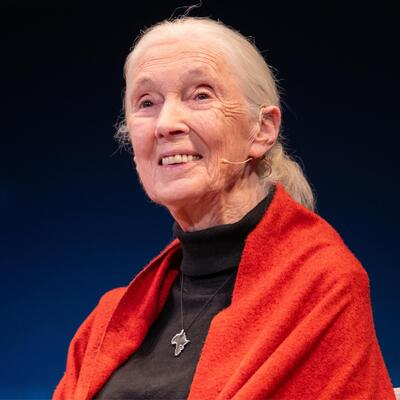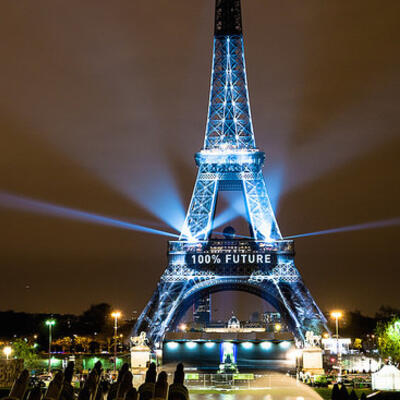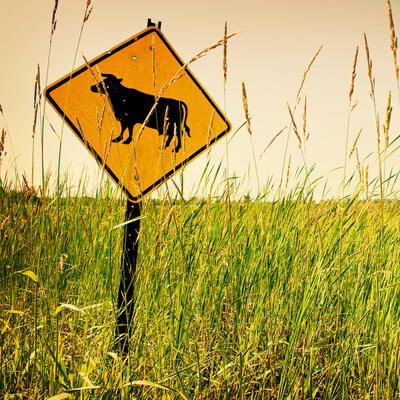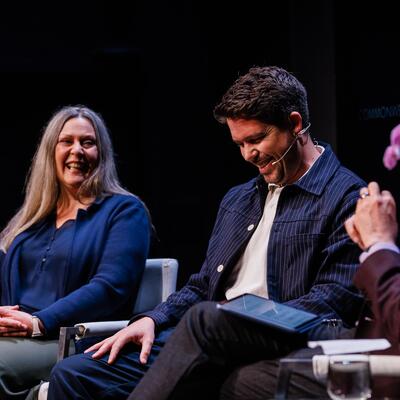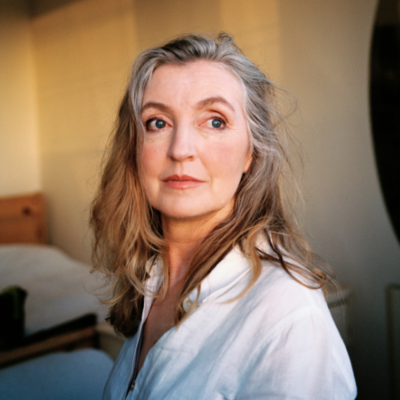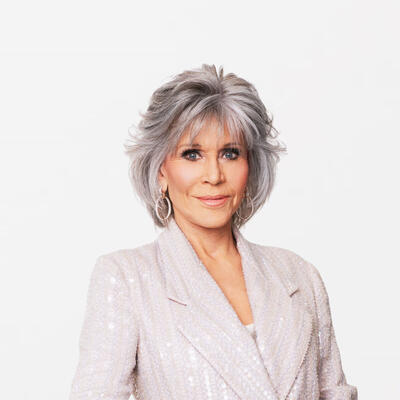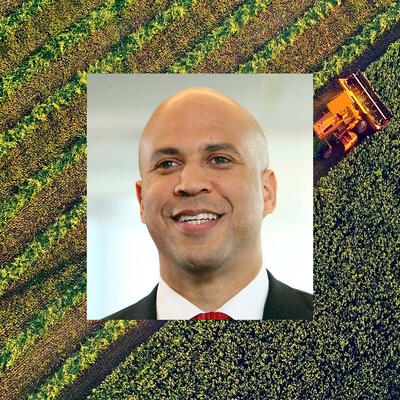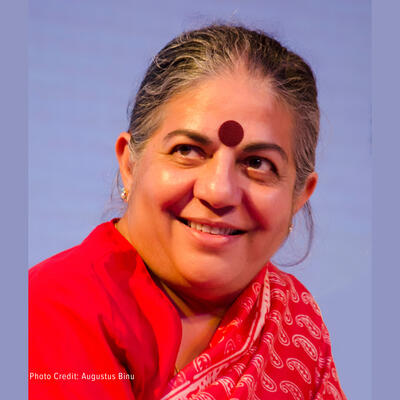
Vandana Shiva and the Hubris of Manipulating Nature
Guests
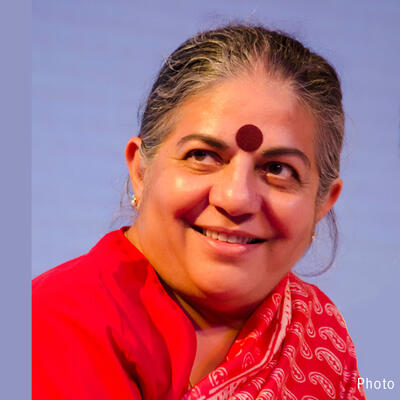
Vandana Shiva
Summary
What are the limits on how much humans should meddle with the natural world?
Vandana Shiva is an eco-feminist, activist, editor, and author who has spent much of her career opposing corporate-led globalization, particularly in agriculture. She is the founder of Navdanya, a movement for biodiversity conservation and farmers’ rights.
Her activism began in college, when she volunteered with the nonviolent grassroots Chipko movement led by women aimed at stopping deforestation in Northern India.
“And the women said these forests are not timber mines. These forests are sources of solar water and oxygen and every day we realize how that is the basis of life,” Shiva says.
She studied physics as an undergraduate, and holds a PhD in philosophy from the University of Western Ontario focusing on the philosophy of physics. She’s received numerous awards for her work and has also been called “anti-science” by her detractors, which include prominent scientists.
Shiva is highly critical of how humans have changed our relationship with the land through industrial monocrop agriculture. She fiercely opposes the use of genetically modified crops, and has called seed patents “bio-piracy.”
“Because what nature created you claim as your creation, and GMO in that worldview means God Move Over, GMO,” she says. But it’s not just the technology she’s critical of.
“I’m critical of the world view of arrogance. The worldview that came with colonialism, the mechanistic mindset of the conquering man being the creator of the earth and creator of the wealth,” Shiva says.
She argues for a renewed focus on biodiversity and regenerative agriculture to help solve the climate crisis, as well as improve our nutritional health.
“Small farms produce more, biodiversity produces small because it works in cooperation...the more you intensify the flows of nutrition in the system, the soil regenerates, the plants regenerate, the pollinators come back and you actually have more nutrition per acre rather than yields per acre,” she says.
“So, this debate that's been created ‘oh, you’ll need more land’ is a false debate. It's chemical farming that needs more land. It's commodity farming that needs more land. Otherwise why would the soil lobby have invaded into the Amazon [rainforest] just to grow GMO soya? Most of it for animal feed and biofuel? The expansionism of GMO soya I should tell anyone that this is not about feeding the world, but it is feeding profits.”
Despite her criticism of the global power structures, she believes we have the power to change for the better.
“And if we are able to make that leap from monocultures to diversity, from superiority to equality, from destruction as creation to co-creation in nonviolence, then humanity has a hope,” Shiva says.
Related Links:
Navdanya
Full Transcript
Greg Dalton: This is Climate One. I’m Greg Dalton. Today, Indian eco-feminist Dr. Vandana Shiva talks about her opposition to industrial agriculture and genetically modified crops. She’s called seed patents “bio-piracy”:
Vandana Shiva: So, why do I call this biopiracy? Because what nature created you claim as your creation and GMO in that worldview means God Move Over, GMO.
Greg Dalton: But it’s not just the technology she’s critical of.
Vandana Shiva: I’m critical of the world view of arrogance. The worldview that came with colonialism, the mechanistic mindset of the conquering man being the creator of the earth and creator of the wealth, that they basically stole.
Greg Dalton: Vandana Shiva on tapping biodiversity to counter the hubris of corporations manipulating nature. Up next on Climate One.
Greg Dalton: What are the limits on how much humans should meddle with the natural world? Climate One’s empowering conversations connect all aspects of the climate emergency. I’m Greg Dalton.
Greg Dalton: My guest this week is Dr. Vandana Shiva. She's an eco-feminist who has spent much of her career opposing corporate-led globalization, particularly in agriculture. She holds some controversial opinions, and has been called “anti-science” by her detractors, which include prominent scientists. Although she studied physics as an undergraduate, she holds a PhD in philosophy from the University of Western Ontario focusing on the philosophy of physics. In fact checking this interview, I found some of her numbers to be problematic. We edited the show to focus on her larger themes rather than specific figures, which lacked precision. At the same time, I found Dr. Shiva to be provocative, controversial and insightful, especially when she was questioning my own linear and western-centric thinking. During the 1970s Vandana Shiva was active in the grassroots Chipko movement led by women aimed at stopping deforestation in Northern India. I asked what drew her to that cause.
Vandana Shiva: Greg, I’ve grown up in the forests of the Himalaya. I was born in the forests of the Himalaya. My father was a forest conservator. And before leaving for Canada for my PhD in the foundations of quantum theory, I just wanted to carry a bit of my home with me so I went for a short trek. And this oak forest that I used to walk in had disappeared. And the stream that came from it, was a trickle. I was of course taking a flight the next day to Canada so I continued. But while talking to, you know, waiting on the road for the bus, chaiwala started to talk of how Chipko had started and now there’s hope. And I asked more and he knew a little bit about women’s action. But I took a pledge in my mind that every vacation I’ll come back and I’ll meet the people and volunteer for this movement. So, that's what I did. Every summer, every winter I would come back from Canada and volunteered for the Chipko Movement. So, it’s the disappearance of a forest that led me to it. And now while the forests are burning in California, in Canada, I’m thinking of the slogans of the women who never went to school. They defended the oak tree and they sang songs and said the oak gives us water. The oak leaves become the streams and they were talking about humus and they were fighting against monocultures. And the women said these forests are not timber mines. These forests are sources of solar water and oxygen and every day we realize how that is the basis of life. People died during COVID for lack of oxygen. People are dying for lack of water. A billion people and more are dying for lack of food. This is exactly the message that women simple women from the Himalaya would give me and I say they gave me; they became my professors of ecology and biodiversity. I did a PhD in Canada but a non-PhD learning that has lasted me my life from the Chipko university.
Greg Dalton: So, I wanna get back to Chipko. But you said a billion people dying from lack of food that sounds like bit of an exaggeration, a billion people dying?
Vandana Shiva: Oh, a billion, sorry, a billion people are hungry. And not just undernourished really denied. If you take the undernourishment figure, you know, there are two sources of undernourishment. One is you don't have access to food. And this is happening also to the farmers who are growing food. Half of the hungry people of the world are agricultural people who are growing rice with chemicals for which they had to borrow money so when they grow the rice they have to pay back the agent of the chemical fertilizer and the pesticide and the seed agent. So, they grew the rice but they can’t eat it. And when they sell it, it sells for very low. When they buy the same rice it’s four times more. This is the polarization of prices that globalization has created. And that means the same farmers who grow the rice starve. The second is the food itself is now nutritionally empty because the soils are depleted of nutrition. And the nutrition in our food comes from two sources. The seeds we are not breeding for nutrition we are breeding for weight. It's the ultimate Cartesian victory, you know, how big is the apple, how heavy is your soya bean, not how much nutrition is in. That’s why I shifted to nutrition per acre and we can feed two times the world if we conserve biodiversity. The third reason why people are hungry we are not eating food anymore. It's empty food. You know this junk food like stuff. So a billion people are hungry, but 2 billion are sick because of these food-like substances where the industry is growing and stuffing it down, and the American diet is now being spread and everybody have diabetes you have cancer you got metabolic disorders.
Greg Dalton: Yeah, sometimes I think about yeah there’s a food industry that gets us sick and then there's a medical industry that wants to sell us drugs after we get sick from the food that is sold to us. Much of your work has been to promote biodiversity and agriculture, just as you articulated, specifically fighting against corporate patents on seeds and the use of GMOs. You’ve called seed patents biopiracy how much of your objections of the technologies themselves versus who controls it the consolidation of power so much power in few hands.
Vandana Shiva: The technology and patenting are wedded from birth. The patenting was the aim, the technology was the means to achieve that aim. The false claim was made that by tweaking one gene or shooting one toxic gene, a bt toxin, a Roundup Ready, we are the inventors and creators of life and therefore we own the seed, this seed and its 20 generations to come. And these are cases that have gone to the Supreme Court there’s a very famous case of Monsanto versus a farmer in US where they actually ruled that the seed is a self-replicating machine. And even if you didn't buy the seed from Monsanto you bought the grain in an elevator, it is still intellectual property. Having done my doctorate work on nonseparation. Having done my doctorate work on potential. I said, but the seed is self-organized autopoiesis in making billions of years of evolutionary history in it. The farmers have bred these seeds, the qualities of the seed, the true qualities outside the toxic qualities. The aroma of our basmati, the known gluten properties of our wheats. These weren’t created by Monsanto or genetic engineering. They were bred by the farmers. So, why do I call this biopiracy? Because what nature created you claim as your creation and GMO in that worldview means God Move Over, GMO. God Move Over. Creation is us. The second is all indigenous people, the minimum we can claim is 10,000 years. 10,000 years we farmed we have bred seeds, one grass, oryza sativa became 200,000 rice varieties with the brilliance of Indian peasants. Maize, one teosinte became the thousands of maize varieties in Mexico and in Peru and in the first nations of America. That brilliance of breeding is denied and the corporations here when I shoot a gene, I create a seed. It is so ontologically wrong, but it's also ethically wrong and epistemologically wrong. So, when you asked me what I’m critical of, I’m critical of the worldview of arrogance, the worldview that came with colonialism. The mechanistic mindset of the conquering man being the creator of the earth and creator of the wealth that they basically stole. So, you know, there's a way in which in our age, the religion that was the colonizing mission. The first colonization, oh I got to be a Christian all those little kids from the indigenous peoples the first nations thrown into boarding schools. Thousands died; the graves are just being found. That is all to make them civilized through Christianity. Today’s civilizing mission use the mysterious word technology. But technology is merely a tool at any point humanity is brilliant enough to have 5, 10, 20 tools to choose from. That is technological democracy. And the minute you put technology at the level of religion with a capital T in the hands of five men, then that's when hubris substitutes democracy.
Greg Dalton: And one of the biggest seed controversies has been over golden rice, a variety genetically engineered to provide vitamin A. According to the WHO vitamin A deficiency is responsible for 1 to 2 million deaths a year plus another half million cases of blindness. This sounds like a pretty good idea to fortify rice with vitamin A.
Vandana Shiva: Well, it would be a good idea, Greg, if there was no other source of vitamin A. One, when you need vitamin A what do you eat? You eat curkman. Why is vitamin A the precursor called Beta carotene? Carrot is there --
Greg Dalton: Yeah, leafy greens, right. But if it’s so readily available then there wouldn’t be such a vitamin A deficiency.
Vandana Shiva: So, why is there a vitamin A deficiency? Let's go back to the green revolution Norman Borlaug who took mixed farming with lots of vegetables, lots of greens, lots of pulses, and lots of oilseeds. And then said, no, I want to sell my fertilizers the leftovers of the war and therefore we must have monocultures. When you have an external input system you have to have a monoculture.
Greg Dalton: Those fertilizers based on fossil fuels partly, right?
Vandana Shiva: They are based on fossil fuels 1 kg of urea fertilizer requires 2 L equivalent of diesel. The same companies made the explosives and ammunition and made the fertilizers. And, you know, it’s the same buyers and you talked earlier about some of them make us sick and then others make a profit it’s the same people who make us sick. But coming back to the issue of vitamin A deficiency. So, you create monocultures and what is Roundup, Roundup as the debates in the biodiversity convention used to show Monsanto would get up and say we prevent the weeds from stealing the sunshine. Well, the sun is so generous and it grows biodiversity. The beautiful amaranth, which is being made a superweed with Roundup resistant soy and Roundup resistant corn in the fields of America and now they’re using dicamba and more and more virulent herbicides. What was called weeds are sources of food, are sources of vitamin A. The second big reason is that when you do so-called high-yielding varieties with chemical fertilizers. First, your high-yielding variety is merely taking more out of the farm destroying the straw which would go back to the soil to make the nutrition. You've destroyed the nutrition cycle of the earth, you've destroyed the nutrients in the soil, the zinc, the iron, everything else that makes us healthy. So, you’re having nutritionally empty food. So, you have a monoculture, you have nutritionally empty food then you do milling, industrial milling is a way to take nutrition out but they’re so clever then they sell the bran as a separate product. They sell rice bran oil as another product. So, they dismember a product which you would eat in wholesome ways. So, it's a dysfunctional system to make more and more money for a few people, and we have watched how to dump GMO soy on India. The industry just ganged up and banned our edible oils. They banned our local cold pressed virgin mills, 5 million just made illegal overnight. And there’s a woman who came to me and said bring back our mustard. We cannot eat food cooked in GMO soya. And we have to do a satyagraha, satyagraha is Gandhi’s word of noncooperation. Satya, truth. Agraha, force. He told us how to throw the British out.
Greg Dalton: On GMOs. I hear your points about control and the mindset and the worldview. Though the World Health Organization, the American Medical Association, the US National Academy of Sciences, the British Royal Society have all examined the evidence and concluded that consuming foods containing ingredients derived from GM crops are no riskier than consuming the same foods containing ingredient from plants modified by conventional improvement techniques. So, acknowledging all the things you said about GMOs and control and power. Will you acknowledge that as a scientist GMOs are safe for humans to eat?
Vandana Shiva: But we never even started talking about it as food. We were talking about it in the field as a crop. And the reason I played a big role in writing, working with governments to write Article 19.3 of the Convention on Biological Diversity which led to the biosafety protocol on which I was appointed as an expert. Biosafety is about the impact on biodiversity. What does it do what does Bt toxin do to the bees and the butterflies? What does Bt toxin do to the soil organisms? So, the impact on biodiversity, the impact on public health and now added to it is the social economic impact on farmers. In India, we’ve lost 400,000 farmers to suicide. 85% of them this is from government data, you just have to do the Bt cotton map the GMO map and map the suicides. 85% are in the cotton area 95% of it Monsanto so --
Greg Dalton: I did read a Brookings Institution report that said that per capita kind of questioning with some of the trends of the Indian farmer suicide. So, there is some debate there, tragic, there are some debate about whether it's out of proportion to other countries, etc. but that is certainly something that's very serious.
Vandana Shiva: Yeah. But let me come back to the GMO question. To talk about food means it's all right if you do lose your biodiversity. I think the biosafety question is about the relationship of the crops we grow and the evidence is now so clear that GMO crops have failed to do what they were claimed to do Roundup Ready crops were introduced in order to control weeds, American farmlands are overtaken by superweeds. A plant is a self-organize complex system. And the weeds they evolved resistance just like antibiotics, resistance is growing. The more antibiotics used in the animal farms in your factory farming you’re gonna have antibiotic resistance. So, we come back again to the signs of living systems, the technology where it was applied has failed. I don’t think big scientific institutions should be looking at the wrong place. We're talking about crops and biodiversity. No one talked about food safety and in the early days of course no one died of DDT immediately. Rachel Carson was attacked because she pointed out the harm. Today we know. So, I mean neither GMOs nor chemicals have instant impact. The impact builds up over time. But on life on earth it does have impact. Poisons kill immediately and are the basis of the extinction crisis. So, anyone who cares about diversity of species should be looking at the tools that are driving species to extinction. So again, we have to think in systems ways we have to think in interconnections.
Greg Dalton: You’re listening to a Climate One conversation about the hubris of manipulating nature with Indian ecofeminist Dr. Vandana Shiva. If you missed a previous episode, or want to hear more of Climate One’s empowering conversations, subscribe to our podcast wherever you get your pods. Coming up, Shiva shares more about how she sees industrial, globalized agriculture hurting our natural systems, including those like the Amazon rainforest that are essential to the planet’s resilience:
Vandana Shiva: It's commodity farming that needs more land otherwise why would the soil lobby have invaded into the Amazon just to grow GMO soy. Most of it for animal feed and biofuel. The expansionism of GMO soya I should tell anyone that this is not about feeding the world, but it is feeding profits.
Greg Dalton: That’s up next, when Climate One continues.
Greg Dalton: This is Climate One. I’m Greg Dalton, and we’re talking with Indian ecofeminist Vandana Shiva. We pick up our discussion on industrial monocrop agriculture.
Greg Dalton: So, I certainly see the capitalism is about creating revenue streams and intellectual property helps lock up technology that secures revenue streams and therefore profits for the capitalistic system. But the system you’re describing are so entrenched and complex how do we change them? Some people would say organics are more nutritious and counter many of the things you’re talking about. Others would say organics require too much land, that organics cannot scale and feed the world.
Vandana Shiva: So, you know, that was the word when Europe was the center of the world. We used to talk about the Eurocentric worldview. And I think now that the US thinks it’s the center of the world that’s a very American centric worldview. But most of the farms of the world are not like what has been made of the American farmlands. Agribusiness has destroyed farming in America. Small farms produce more, biodiversity produces small because it works in cooperation. So, the more you intensify chemicals, you intensify commodity production which doesn't feed you. But the more you intensify biodiversity, the more you intensify the flows of nutrition in the system the soil regenerates the plants regenerate the pollinators come back and you actually have more nutrition per acre rather than yields per acre. So, this debate that's been created oh, you’ll need more land is a false debate. It's chemical farming that needs more land. It's commodity farming that needs more land otherwise why would the soil lobby have invaded into the Amazon just to grow GMO soy. Most of it for animal feed and biofuel. The expansionism of GMO soya I should tell anyone that this is not about feeding the world, but it is feeding profits.
Greg Dalton: And climate is disrupting agriculture small-scale agriculture large-scale agriculture. Lot of small-scale agriculture as you know is done by women. Is there a technology that can help provide food security and help women farmers isn’t some of that positive? What kind of technology can you see helping?
Vandana Shiva: So, Greg, I think the first issue is it's not just that agriculture is being impacted by climate change. Industrial, globalized agriculture based on fossil fuels and fossil fuel-based chemicals is 50% of the climate problem. The figures are there it just usually they look at only agricultural production. But in agriculture production itself when you see those giant machines moving, they’re all fossil fueled driven. When you see the urea applied to the fields it's emitting nitrous oxide which is 300 times more damaging to the atmosphere than carbon dioxide and it is the planetary boundary more structured. I do not know why nitrogen is not in the discussion on climate change.
Greg Dalton: In this part of our conversation, Dr. Shiva cited several figures that I thought to myself, we better check that. And we did. It is true that nitrous oxide is 300 times more damaging to the atmosphere than carbon dioxide and nitrogen is not a big part of the climate discussion. Her claim that agriculture is half of the climate problem is problematic.
Agricultural emissions have been hotly debated since a 2006 report from the UN Food and Agriculture Organization called Livestock’s Long Shadow. That report pegged agriculture at 18 percent of global emissions, and the FAO later lowered the number to 14- percent. But direct emissions from growing food and harvesting it with machinery burning fossil fuels is only part of the story. Indirect impacts - such as clearing forests to grow corn and soy to feed to cows to make burgers - is also a significant part of the equation. The math gets complicated fast. A recent Mckinsey study based on IPCC data pegs agriculture emissions at 20 percent and land use changes and forestry at 7 percent. That means the total for ag, forests and land use change is 27 percent - almost as big a source of emissions as industry.
Vandana Shiva: I think that's where people need to become a little more thinking. The third is processing why are we taking good healthy food and turning it into junk that makes us sick and destroys the planet. Ultra-processed food is the single biggest cause of chronic diseases which are making us more vulnerable to infections like COVID. So, processing we could do with much less, and more. Transport, we don’t have to move food miles we call it food miles. This shipping containers of green and vegetables across the world we need to localize more. And then retail, Mr. Jeff Bezos just went for 10 minutes into space all over the place comes down and says two things that everyone should be outraged with, all listeners of Climate One should be outraged with. The first he says, oh, now after my 10-minute ride we can put all the polluting industry into other planets. Are you crazy? Are you crazy? You've destroyed this planet and you with your shipping a one parcel for one hairpin are big polluter. No one has done the ecological footprint of Amazon distribution. But more importantly he sits there arrogantly and says, while people are fighting for day wages, workers compensation. He sits there and says; I want to thank all the customers and workers of Amazon who sent me for a 10-minute flight. That irresponsibility is the hubris.
Greg Dalton: Right. Stephen Colbert just said he wants Jeff Bezos to pay some taxes.
Vandana Shiva: But let me complete the figures of the emissions from industrial, globalized agriculture, not agriculture, but industrial globalized agriculture. 20% from turning food into rubbish that is destroying the planet and our health. And then because you're privileging long-distance movement and uniformity you have waste. If I’m growing food locally there’s no waste. I can feed my cow. I can compost it. No food goes waste. But long-distance transport makes waste. Now, when you asked me is there a technology that's where I think for the Western industrial civilization the big quantum leap in their minds has to be technology is any transformation. So, when a person breed seeds they are involved in breeding technology. Breeding doesn't begin with Monsanto poisoning the seed. When a leaf, a beautiful leaf takes the sunlight and the carbon dioxide and through photosynthesis transforms this into the oxygen that we breathe and keeps us alive, and the carbohydrates that are the basis of all the food and fiber of the world that is the most sophisticated technology for taking common dioxide out of the atmosphere, putting it into plants turning it into food, putting it back into soil, turning it into fertile soils. Our assessments the community that created the regeneration movement. We have the regeneration international all the scientists were working on the link between the biosphere and the atmosphere are showing that if we stop fossil fuels today and don't lead to new emissions and I do believe polluter should pay and not make tricks through like net zero, we can talk about that later, but we basically can if we stop the pollution in agriculture, if we stop the chemicals in a 10-year timeframe, we can feed the world, regenerate more wilderness. We can have more nourishment and the bees can come back and have the habitats, but most importantly we can do this all in 10 years, 10 tons is the amount we can add every year. The research is showing this. And on our farm at Navdanya we do these studies on how with biodiversity intensification intensifying photosynthesis biomass, biodiversity you can actually heal the cycle and regenerate rather than degenerate the planet.
Greg Dalton: Dr. Vandana Shiva is ecologist, activist, author and director of the Foundation for Science Technology and Ecology. We’re talking about the hubris of manipulating nature. I’d like to ask you Dr. Shiva, you know, I was quite relieved when I received my first and second COVID-19 vaccine. Have you been vaccinated? I know that it was quite bad in India.
Vandana Shiva: I’ve been vaccinated, but the data is not very reassuring. In England more people have died, who were vaccinated than those of who are not.
Greg Dalton: Well, that could confusing causation and correlation because someone vaccinated and died, they could've died from a heart attack or cancer or something else. It doesn't mean that the and this is I think the kind of statement that sometimes causes people to say you’re anti-science.
Vandana Shiva: But there’s multi causation in any system, and therefore we need to look at the system as a whole. And that's why people like Fritjof Capra who was also a physicist and has written amazing books and is in the Bay Area. We talk of system science and system science means all relationships must be taken into account, and Cartesian logic is what is the block to understanding both the causes of climate change and the impacts. Understanding disease multi factoral and therefore we talk of all dimensionality. The three dimensions of space, not just the two-dimension of Cartesian space and time unfolding. You know, 400 years later we’re still stuck with a linear one-dimensional mechanistic paradigm, which says the nature is dead. One thing has one impact. And we are making our body sick. We are making the planet’s body sick because of the wrong paradigm that suited colonization.
Greg Dalton: And we’re not taught that in school. But back to the COVID vaccine. The COVID vaccines are mRNA vaccines they teach our cells how to make a protein that triggers an immune response inside our bodies. You received it. I received it. Is that manipulation of cellular protein?
Vandana Shiva: No, no, no, no. Again, you are Americanizing the world. America has some vaccines. India has others. We have Covishield and we have Covaxin. So, I don’t think, you know, like the Eurocentric obsession that the whole world would be shaped by a European mind. I do think you have to learn to be earth citizens in America. There are indigenous cultures all over the world. There are sovereign countries making decisions on seed, food, agriculture, medicine, vaccines, most of the countries don't have patents on seed, I help my Parliament write laws. Seeds are not human inventions therefore they cannot be patented. So, countries like India have sovereign laws, and we are the biggest vaccine makers of the world. But we also have sovereign decisions about which vaccines we will choose.
Greg Dalton: Fair enough. And India is now the world's third largest emitter of carbon dioxide after the US and China. Granted India still living in the shadow of colonialism. There’s also a rising middle class in India and China that is aspiring to higher levels of consumption material comforts. What responsibility does India have with regard to its own emissions?
Vandana Shiva: Well, I think the first thing is we need to remember that while we are politically sovereign. Globalization made the economic system one integrated corporate production machine. Which outsourced everything at that time to China --
Greg Dalton: Emissions were exported. Manufacturing and emissions were exported.
Vandana Shiva: So, that is why it’s wrong to talk merely about consumers. We got to look at the production system. We got to look at the corporate role. It’s the industrialized countries. If you take the shared production into account. Not the geography, you know, if you followed Lawrence Summers at the Earth Summit where he said, oh, the Third World doesn't have enough pollution and we must export pollution to them and shift our polluting industry like Jeff Bezos wants to shift polluting industry to other planets. So, this idea of exporting toxics exporting pollution exporting waste is based on basically a racist divide an apartheid that you take the sickness and this is the debate of environmental justice and climate justice all over the world.
Greg Dalton: Sure. That definitely happened, exporting manufacturing, exporting the emissions and there are still rising middle class that have their own domestic emissions and that is part of it. There's 300 million people who’ve come out of poverty, into the middle class in China. I don't know how many in India and that is a real force for growing emissions. Most of the historic emissions are red, white and blue which means they’re French and British and Russian and American. But there is I’m trying to get to the point of some, there’s a lot can be blamed on colonialism. A lot can be blamed on exportation and globalization, which may be driven by the forces you cite. But what responsibility do emerging economies have, they have some don’t they?
Vandana Shiva: Yeah, Greg, so if I have a vegetable vendor outside my door and I just go step out and buy my fresh tomatoes and my fresh cucumbers. And that option is destroyed because Mr. Jeff Bezos comes and shifts everything so that during the lock down the vegetable vendor is not able to sell but Mr. Bezos continues to sell and these are debates, they are ongoing debates right now on retail, yeah, on retail issue. So, when you talk consumption, Greg, is extremely important to think about forced consumption. Forced consumption in food it is always forced. The second is, you know, we’re a land of clothing, India was colonized for its spices and textiles. But you think changing in the clothing system is not part of the fast fashion industries big propaganda machine. You know, consumers are not little atoms by themselves, they are when they are made unthinking consumers of advertising signals and options that are closed for them. They will make choices that suit the profits of the corporate world. When they are free citizens who are able to think culturally in the civilization, able to think about the footprint of their actions. That's why I talk about earth democracy. That's why I talk about earth citizenship rather than consumerism. Again, we come back to Mr. Descartes. We separate consumers from production but it's one system. We separate corporate profits from the choices consumers make. Why are the young people of the world rebelling? They’re seeing the links the fact that young people on the streets and striking is they are seeing the links.
Greg Dalton: You're listening to a conversation with Indian ecofeminist Dr. Vandana Shiva about how far we should go in manipulating nature to suit our needs--agricultural, climate, or otherwise. This is Climate One. Coming up, her belief that we can all change, for the better:
Vandana Shiva: Everyone has potential. You know it's not the fact that you're born white and you're stuck in white superiority. The potential to be earth citizens is in you.
Greg Dalton: That’s up next, when Climate One continues.
Greg Dalton: This is Climate One. I’m Greg Dalton. I’m talking with Dr. Vandana Shiva about the concentration of power by corporations. Some criticized the Trans-Pacific Partnership supported by President Barack Obama for being too all-encompassing--in one example, local regulations restricting the sale of tobacco to young people could be seen as an obstruction to trade. President Donald Trump did away with the TPP. I asked Dr. Shiva if she agreed with that move.
Vandana Shiva: Well, I basically think that globalization and free trade whether it is the World Trade Organization or the TPP or The Atlantic Treaty or the bilaterals being worked out are really corporate rule, that’s how we call it in the international forum on globalization. Now when corporations write the rules, they will write rules against democracy. They will write rules against constitutions. They will write rules against the environment. They will write rules against worker’s rights and these are rules of deregulation. So, what you've just cited is part of all the new free-trade agreements. Interstate dispute settlement mechanism and this is wonderful right just like Columbus got a charter or East India company got a charter saying go take those lands. They write their treaties and then say all of this is ours for profit. And if a government makes a decision according to its Constitution and according to its people's will. Then we will sue them for stealing our markets that don't exist, but they are our right. And I'll give you just two examples. You gave the example of tobacco. But remember after Fukushima the Germans were out on the street and they insisted that all the nuclear plants be phase out. And Germany had to take that decision under huge democratic pressure. So, the nuclear plant was shut and a Swedish company, which had a nuclear plant sued Germany billions of dollars that we have lost so much profits now you pay us. So, this industry dispute settlement clauses are basically been set at home. We write a treaty, the violation of the treaty because the Constitution doesn't allow it or the people don’t allow it will be, we will have so I’ll give you one example. I’ve been part of the movement for water as a commons and against water privatization. And we stopped the privatizing of the Gangla by Suez, the World Bank was trying to push it. Again, we did civil disobedience we marched the streets I brought water pots to the World Bank. But Bolivia, its water was privatized by the World Bank and it is given to Bechtel, which the American company. And Bechtel of course increase the price six times but when people started to harvest on their rooftops, they said even the rain you cannot harvest. When people started to dig wells so they wouldn’t have to pay huge price they said even the groundwater is ours.
Greg Dalton: Yeah, I think there’s a movie made about that one, yeah.
Vandana Shiva: And the fact that indigenous people then came into governance is because of that movement of people in Bolivia. When Bechtel was thrown out, but Bechtel is still demanding compensation. So, you know, corporate rule is the problem. Corporate rule is the problem.
Greg Dalton: They have contracts. And I may agree with you about how corporations have assumed an unhealthy amount of power or international system legal system having the rights of individuals and yet the climate emergency is urgent. It is severe. It is affecting everyone. And there are some corporations that are moving using their power to move away from fossil fuels toward cleaner energy. We may not like the system but isn’t it good that some large corporations are moving toward cleaner energy isn’t that a positive force? Are corporations always bad is everything big bad?
Vandana Shiva: Well, everything big where there is a small as an alternative is not the most desirable option. So, you know, again, sadly the energy question has been reduced to an external input system. Just like in agriculture where you give organic matter to the soil and then the soil organisms make your fertility, the soil is living, they forgot the soil is living. They forgot that the plants are living. They forgot that the earth as a whole Gaia is living.
Greg Dalton: So, you’re challenging the way I'm asking the question. Because I asked a question about shouldn’t we change the energy inputs and you’re saying that that’s the simplistic linear Cartesian way to look at the system. I should be looking more holistically, systemically, that you’re challenging my narrow question.
Vandana Shiva: No, I’m talking about we’ve been given because of corporate rule and a fossil fuel civilization, a highly centralized external input system for everything we do. We can shift to a fossil fuel free and a poison free agriculture. This is what I’ve done 37 years of my life. We produce more food we regenerate soil health we brought back biodiversity we have six times more pollinators in our farm than in the forest next door. Our water level has come up 70 feet. We don't do one thing we do many things.
Greg Dalton: And is that economically viable?
Vandana Shiva: Of course, it is. Our farmers, I’ll tell you a title of a book. We’ve done a true cost accounting book called Wealth Per Acre because we were always told farmers make more in a chemical system. We did the true cost accounting. What is a farmer growing Bt cotton earn? What is a farmer growing organic cotton earn? What is a farmer growing millets earn, what is a former growing soya bean earn? And on an average, if the farmers have their own seed if the farmers have their own ecological agriculture production with internal input systems. If the farmers have economic sovereignty to shape the market where we need the bigness of the global market to step out of this way because we have local markets. Farmers have to eat. When you shift that the farmers are earning 10 times more than those participating in the production of chemical commodities for a global supply chain. So yes, farmers earn more but you have to do a true cost accounting and you have to change your measures because the problem with globalization is it only measures trade. It doesn't measure production. The problem with the economy anyway that came out of commerce of colonial commerce is it basically says if you produce what you consume, you don't produce. And this is how nature's production was wiped out. This is how women's production was turned to zero, and this is how peasant production, which is what feeds the world was reduced to zero. So, we have too many false assumptions in our systems. And once we shift out of them and you can only shift out of them by looking at the big picture. What we find is the inevitability that the bigness of the problem requires big corporate control as a solution when the solution lies in decentralized democratization of the food system, the energy system, the mobility system, urban systems. And those are the initiatives taking place all over the world. All I'm saying is let’s not assume bigness as an inevitability. The only thing where bigness where you don't know when to stop growing that bigness the only entity that has that property outside corporations is the cancer cell. Every other cell knows how much to grow and when to die off and be replaced. So, bigness is not a virtue. Schumacher, brilliant thinker, co-worked a lot in India. Schumacher said and wrote a book called Small Is Beautiful.
Greg Dalton: Certainly, small businesses are the backbone of the US economy. And speaking of small, you said that individual should never give up their power in the face of climate change. Many people, even those with institutional power feel inadequate. So, what do you say to regular people who think they have no power to affect something so colossal as these systems you’re talking about?
Vandana Shiva: Well, I would basically say to ordinary people, but the havoc, I’ve never called it climate change because climate change makes you think in a comfortable way, you know, temperature will rise in this way. No, look at the floods in Europe.
Greg Dalton: Climate disruption, climate chaos, sure.
Vandana Shiva: I call it climate chaos from the beginning when I wrote my book, Soil Not Oil I called it climate chaos. You don’t know when the next extreme event will take place and what its form will be. There is no model, no matter how big your supercomputers be.
Greg Dalton: We’re certainly seeing that this summer with floods and fires. Yeah, it’s devastating.
Vandana Shiva: Well, the three things are I think all of us should have a deeper understanding that the disruption of the earth's climate systems comes from not just the use of fossilized material which the earth buried over 600 million years and should have been left underground. But the way it fossilized our mind to me that's the serious question. It fossilized our mind to imagine that this is the only way things can work. But once we get out of the fossil carbon idea.
Greg Dalton: How do we retrain our minds?
Vandana Shiva: We retrain our minds by moving from the mechanistic mind and the monoculture of the mind to the ecological mind and the diversity of the mind. And that is available in the science it’s available in cutting edge science and it’s available all indigenous cultures. All indigenous culture and it’s available in the will of women to sustain community in the earth in spite of patriarchy. That's why I always say, you know, women will show the way, and if there is a future it's because women are showing the way. So, women, indigenous people and Gaia herself, the earth. We’ve got to learn much more to listen to them to learn from them. The second is if you look at the images of Germany, what is happening? The floods came, and if you look at the pictures where was the worst flooding where American-style agriculture has created barren large fields and the storm and then the soil erosion takes place, we are turning the planet into a dustbowl. And when you have extreme rain events a dustbowl creates flats. When a dustbowl is dry, it creates dust storms, but it creates the kind of floods that we are seeing with mudslides. People were helping each other so we need much more solidarity, we need much more community building. And third, we need much more multilayered governance. We need to reclaim the power of community; we need to reclaim the power of the local. We need to reclaim the power of the regional governments. We definitely need to reclaim both the responsibility and the rights of our sovereign governments who cannot be prevented and should not be prevented from doing the right thing. There are false solutions coming from global corporations who say only we have the money. Only we have the money, only we can solve the problem. And they just floated this idea of net zero and Bill Gates has it in his book net zero. And they say it so clearly, we’ll continue to pollute, net zero doesn’t mean zero pollution. It doesn't mean we’ll end pollution which is the principle. Polluters should stop polluting and should pay for the damages caused by past pollution. But most importantly, this net zero is on the one hand they’re saying we won’t reduce our pollution we still have our private jets. We still fly around. We still do global production and when I want to go into space I’m still going to space. But you will adjust to be our offsets.
Greg Dalton: Do you still fly yourself?
Vandana Shiva: Well, we can’t fly anyway but I don’t think -- I think the time is over I’m anyway a very senior citizen, Greg. And I think at some point, you know, I mean it's a good moment to make a shift and I'm talking to you . And then, you know, I’m able to give much more attention to the conservation work the biodiversity work on Navdanya farm or to our colleagues I just spent a week with our colleagues from across India on how not only will we continue our biodiverse conservation we’ll continue organic farming, we’ll continue building local markets. But we are working with farmers becoming the climate gods so that the reports on the impact of the damages and the reports on the experience of resilience which seeds are resilient what organic practices are resilient that people emerge from the ground as climate experts that's our next decade of work.
Greg Dalton: And speaking of god, do you see environmental destruction as inherently patriarchal. I was a little surprised to see you praise Laudato si’ the encyclical from Pope Francis on care for our common home that urged a move away from consumerism. The Catholic Church is the pinnacle of patriarchy, so are there powerful white men you think are positive forces on climate and perhaps even have feminine sensibilities?
Vandana Shiva: I've written so much about the fact that Pope Alexander wrote the papal bull to conquer the lands. Well, the Pope before him wrote the bull to burn 9 million people as witches just because they believe we are part of nature. And, you know, being part of nature was made illegal, you are engaged in witchcraft if you thought you’re a part of nature. You had to separate yourself. So, the burning of witches, colonialism all goes hand-in-hand. I do believe very sincerely and again, I come back to my quantum training. Everyone has potential. You know it's not the fact that you're born white and you're stuck in white superiority. The potential to be earth citizens is in you. The fact that Popes and the church has been part of the crimes against humanity over history doesn't mean a current Pope doesn't have a potential to realize that he can correct the church and the encyclical is a correction. So, potential, potential, potential means all of us can be earth citizens equal but diverse. All of us can be feminist men and women, all of us can be indigenous and that's the major, major shift we need to make. And if we are able to make that leap from monocultures to diversity from superiority to equality from destruction as creation to co-creation in nonviolence then humanity has a hope.
Greg Dalton: Thank you, Dr. Shiva.
Vandana Shiva: Thank you, Greg.
Greg Dalton: On this Climate One... We’ve been talking about the hubris of manipulating nature with Indian ecofeminist and activist Dr. Vandana Shiva.
Greg Dalton: To hear more Climate One conversations, subscribe to our podcast on Apple, Spotify or wherever you get your pods. Please help us get people talking more about climate by giving us a rating or review. It really does help advance the climate conversation.
Greg Dalton: Brad Marshland is our senior producer; Ariana Brocious is our producer and audio editor. Our audio engineer is Arnav Gupta. Our team also includes Steve Fox, Kelli Pennington, and Tyler Reed. Gloria Duffy is CEO of The Commonwealth Club of California, the nonprofit and nonpartisan forum where our program originates. I’m Greg Dalton.
